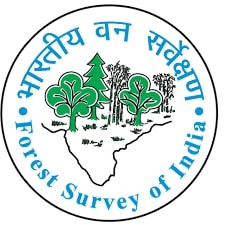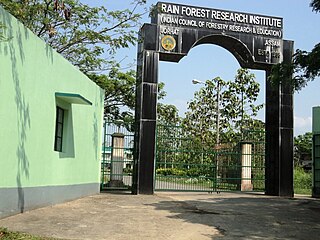
The Central Arid Zone Research Institute (CAZRI) is one of the biggest research institutes of the Indian Council of Agricultural Research (ICAR), an autonomous organization working under the aegis of the Department of Agriculture Research and Education (DARE) of the Ministry of Agriculture and Farmers Welfare of Government of India. CAZRI has the distinction of being one of the first institutes in the world exclusively devoted to arid zone research and development. The institute made a humble beginning in 1952 when Government of India initiated Desert Afforestation Research Station at Jodhpur to carry out research on sand dune stabilization and for establishment of shelter belt plantations to arrest wind erosion. It was reorganized as Desert Afforestation and Soil Conservation Station in 1957 and finally in its present form Central Arid Zone Research Institute in 1959 on recommendation of the UNESCO (United Nations Educational, Scientific and Cultural Organization) expert, Prof. C.S. Christian of the Commonwealth Scientific and Industrial Research Organisation (CSIRO), Australia. In 1966, the institute was brought under the administrative control of Indian Council of Agricultural Research (ICAR), New Delhi.
The Department of Environment and Forests, Government of Assam is a department under the Government of Assam.
Krishi Vigyan Kendra, Jalgaon Jamod is established in Buldhana district, Maharashtra, India during 1994 by Indian Council of Agriculture Research, New Delhi. It is hosted by Satpuda Education Society, a Non-Government Organisation based in Jalgaon Jamod As of 2018, it is one of 680 KVKs in India.

Forest Survey of India (FSI), founded in June 1981 and headquartered at Dehradun in Uttarakhand, is the Government of India Ministry of Environment, Forest and Climate Change organization which conducts forest surveys, studies and researches to periodically monitor the changing situations of land and forest resources and present the data for national planning, conservation and sustainable management of environmental protection as well as for the implementation of social forestry projects.
Krishi Vigyan Kendra Kannur is a front-line agricultural extension center and one of the 700 KVKs financed by the Indian Council of Agricultural Research (ICAR). It opened on 30 March 2004 on the premises of Pepper Research Station, Panniyoor under Kerala Agricultural University. KVK primarily works to influence the other extension systems of the district, caters to the training needs of the farmers and extension functionaries, and facilitates the spread of technologies tailored to the diverse environment of farmers.
Indira Priyadarshini Vriksha Mitra Awards or IPVM Awards are given by Ministry of Environment and Forests of Government of India to individuals and institutions who have done pioneering and exemplary work in the field of afforestation and wasteland development. A cash award of Rupees Two lakh fifty thousand is presented to individuals/institutions in seven categories. It was instituted in 1986 and were given annually. Initially, IPVM awards were given in twelve categories till 2006. But as per 2012 notification of Ministry of Environment and Forests Seven Categories are approved for IPVM Awards.

The Indian Institute of Spices Research (IISR) is an autonomous organization engaged in agricultural research related to spices in India. The institute has its headquarters in Moozhikkal, Silver Hills, Kozhikode, Kerala and is a subsidiary of Indian Council of Agricultural Research (ICAR), New Delhi, under the Ministry of Agriculture, India.

Institute of Wood Science and Technology (IWST) is a Research institute situated in Bangalore in Karnataka. It works under the Indian Council of Forestry Research and Education (ICFRE) of the Ministry of Environment and Forests, Govt. of India. It is recognized to be a Centre of Excellence for Sandalwood Research and Wood Science

Tropical Forest Research Institute (TFRI) is a Research institute situated in Jabalpur in Madhya Pradesh. It works under the Indian Council of Forestry Research and Education (ICFRE) of the Ministry of Environment, Forest and Climate Change, Government of India.

Rain Forest Research Institute (RFRI) is a research institute situated in Jorhat in Assam. It works under the Indian Council of Forestry Research and Education (ICFRE) of the Ministry of Environment, Forest and Climate Change, Government of India.
Himalayan Forest Research Institute (HFRI) is a Research institute situated in Shimla in Himachal Pradesh. It works under the Indian Council of Forestry Research and Education (ICFRE) of the Ministry of Environment and Forests, Govt. of India.
ICFRE-Institute of Forest Biodiversity (IFB) is a research institute situated in Hyderabad in the state of Telangana, India. It works under the Indian Council of Forestry Research and Education (ICFRE) of the Ministry of Environment, Forests and Climate Change, Government of India.
The Institute of Forest Productivity (IFP) is a research institute situated in Ranchi in state of Jharkhand. It works under the Indian Council of Forestry Research and Education (ICFRE) of the Ministry of Environment, Forest and Climate Change, Government of India.
Forest Research Centre for Eco-Rehabilitation (FRCER) is a research institute located in Prayagraj, Uttar Pradesh, India. It was established in 1992 as an advanced centre under the umbrella of ICFRE, Dehradun. The centre aims to nurture and cultivate professional excellence in the field of social forestry and eco-rehabilitation in Eastern Uttar Pradesh, North Bihar and Vindhyan Region of Uttar Pradesh and Madhya Pradesh.

The ICFRE-Bamboo and Rattan Centre (ICFRE-BRC) was established as an advanced research centre under the Indian Council of Forestry Research and Education, Dehradun. in 2004 at Aizawl, Mizoram as a unit of Rain Forest Research Institute (RFRI), Jorhat, Assam in accordance with the decision taken by the Standing Finance Committee, Ministry of Environment & Forests, Govt. of India. The Centre was inaugurated by the Hon’ble Minister of State, Environment and Forests, Govt. of India Shri Namo Narain Meena, on 29th Nov. 2004 at Bethlehem Vengthlang, Aizawl. The Centre is first of its kind in India for socio-economic upliftment of Northeastern people that revolve around Bamboos and Rattans.
The Centre for Forestry Research and Human Resource Development Chhindwara was established in 1995 as an advanced research centre under the umbrella of ICFRE, Dehradun.
Centre for Forest-based Livelihoods and Extension (CFLE) is an Advanced Research Centre situated in Agartala in Tripura. It works under the Indian Council of Forestry Research and Education (ICFRE) of the Ministry of Environment and Forests, Govt. of India.
A Krishi Vigyan Kendra is an agricultural extension center in India. The centres are associated with a local agricultural university, and serve as links between the Indian Council of Agricultural Research and farmers to apply agricultural research in a practical, localized setting. All KVKs fall under the jurisdiction of one of the 11 Agricultural Technology Application Research Institutes (ATARIs) throughout India.






